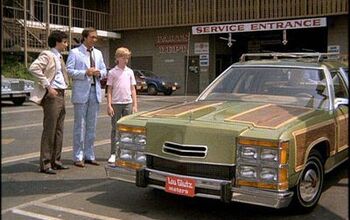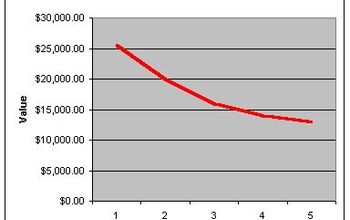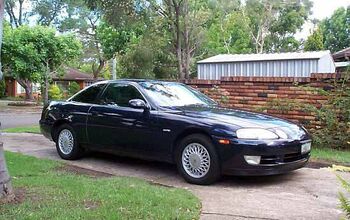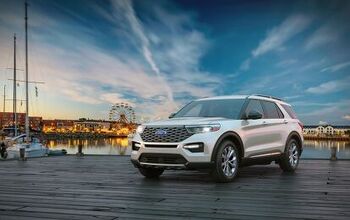Hammer Time: Second Cars
Who needs ’em? Of course the soccer mom and sales folk amongst us really “need” the perpetual motion of a second car. But what about the married schlep who walks to work? Or the enterprising couples that work together? For them a second car may be nothing more than an inconvenience and an expense. Some folks in high places (and low places) say you should go for an alternative that conserves resources and costs less. Fair enough. But is that always a rational choice?
I disagree with the PC folk and their anti-car orientation on this one. Like most of you, cars are a fun filled adventure for me. But for the automotively apathetic out there I will concede that a car is essentially a tool. A very unique and important tool. It’s a point-to-point transportation appliance that is mostly safe, very comfortable, and simple to operate. Let’s assume that a Toyota would be the best type of car for those who simply don’t give a damn because in many cases, it really is. What really competes with the Toyota that doesn’t have four wheels?
Motorcycles? Definitely more fun . . . but usually not as safe, comfortable or simple to operate. One bad accident and you’re toast. The same is true with bikes. I will say from my experiences that they can work well in places with little rain and small commuting distances. Weather’s a bitch. Families require toting and the only way you’re going to get four people on a Trek is if the handlebars are tied to a trapeze.
Public transportation? Again, sure if it’s near work and play. But otherwise it’s neither convenient nor comfortable in most places. If you take the waiting and the sheer number of crazies into consideration, public transportation is usually a non-starter for most folks. Especially for the suburban folk.
So, let’s see. Overall America is unique in that much of our country isn’t really suitable to any of these alternatives. But I’ll tell you what is. A second car. A third car. A fourth car. Lots and lots of cars. But for those who don’t need one every day, why not share? Financially, it can pay off for about ten folks in the same neighborhood to own three or four types of second vehicles for occasional use. In fact I’ve crunched the numbers and so long as the maintenance and driving styles are on the normal side, it works great.
If you need hauling or towing a few times a year one of the vehicles can be a pickup. For part-time folk, and those on a budget, a beater for an occasional A to B jaunt is all you really need. Parents and friends come to town? Get access to a large car or a minivan. The real trick (and this is the big “but” in the equation) is to share the costs with others who live in walking distance and have similar driving habits and maintenance standards.
That’s tough. Even when $4 gas encouraged this type of conservation, most folks ruled out car sharing. There’s a lot of planning involved and the “unknown” is always a fear factor.
Like most things in life though, you do get an a lot of benefits if you really do think it through. Fixed costs decline substantially (insurance, depreciation, purchase price, opportunity costs) while your variable costs for the most part remain the same. Newton’s first law of motion also helps. A car that is constantly running, and stays running, will have fewer mechanical issues per mile you drive it than one that just sits around and collects dust.
Then there’s the reduction in maintenance that can come from using the same type of engine and powertrain in multiple types of vehicles. Familiarity not only breeds acceptance. It also lowers repair bills and let’s you find small problems before they get big. Especially if someone else can find them first. From my vantage point, running cost for a shared second vehicle that isn’t “always” needed will usually cost far less than owning it alone.
More by Steven Lang
Latest Car Reviews
Read moreLatest Product Reviews
Read moreRecent Comments
- Jeff JMII--If I did not get my Maverick my next choice was a Santa Cruz. They are different but then they are both compact pickups the only real compact pickups on the market. I am glad to hear that the Santa Cruz will have knobs and buttons on it for 2025 it would be good if they offered a hybrid as well. When I looked at both trucks it was less about brand loyalty and more about price, size, and features. I have owned 2 gm made trucks in the past and liked both but gm does not make a true compact truck and neither does Ram, Toyota, or Nissan. The Maverick was the only Ford product that I wanted. If I wanted a larger truck I would have kept either my 99 S-10 extended cab with a 2.2 I-4 5 speed or my 08 Isuzu I-370 4 x 4 with the 3.7 I-5, tow package, heated leather seats, and other niceties and it road like a luxury vehicle. I believe the demand is there for other manufacturers to make compact pickups. The proposed hybrid Toyota Stout would be a great truck. Subaru has experience making small trucks and they could make a very competitive compact truck and Subaru has a great all wheel drive system. Chevy has a great compact pickup offered in South America called the Montana which gm could make in North America and offered in the US and Canada. Ram has a great little compact truck offered in South America as well. Compact trucks are a great vehicle for those who want an open bed for hauling but what a smaller more affordable efficient practical vehicle.
- Groza George I don’t care about GM’s anything. They have not had anything of interest or of reasonable quality in a generation and now solely stay on business to provide UAW retirement while they slowly move production to Mexico.
- Arthur Dailey We have a lease coming due in October and no intention of buying the vehicle when the lease is up.Trying to decide on a replacement vehicle our preferences are the Maverick, Subaru Forester and Mazda CX-5 or CX-30.Unfortunately both the Maverick and Subaru are thin on the ground. Would prefer a Maverick with the hybrid, but the wife has 2 'must haves' those being heated seats and blind spot monitoring. That requires a factory order on the Maverick bringing Canadian price in the mid $40k range, and a delivery time of TBD. For the Subaru it looks like we would have to go up 2 trim levels to get those and that also puts it into the mid $40k range.Therefore are contemplating take another 2 or 3 year lease. Hoping that vehicle supply and prices stabilize and purchasing a hybrid or electric when that lease expires. By then we will both be retired, so that vehicle could be a 'forever car'. And an increased 'carbon tax' just kicked in this week in most of Canada. Prices are currently $1.72 per litre. Which according to my rough calculations is approximately $5.00 per gallon in US currency.Any recommendations would be welcomed.
- Eric Wait! They're moving? Mexico??!!
- GrumpyOldMan All modern road vehicles have tachometers in RPM X 1000. I've often wondered if that is a nanny-state regulation to prevent drivers from confusing it with the speedometer. If so, the Ford retro gauges would appear to be illegal.


































Comments
Join the conversation
Oh, for goodness sake, the point isn't communism, it's that to keep people from living where they please (such as a one-family house with a patch of dirt around it) there have to be constraints on their choices. And the commies are masters at constraining individual choice. The affordable personal-use automobile demolished the old time/distance limits. Ever since, planners have been pining for the good old days when trolley lines defined the limits of urban expansion. Sneering at "McMansions" or their residential equivalent, the Cadillac Escalade, is no way to get their proud owners to surrender political power to planners so the latter can compel elitist aesthetic standards.